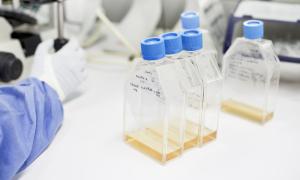IrsiCaixa discovers a new mechanism of HIV resistance to protease inhibitor drugs

Study published in the Journal of Antimicrobial Chemotherapy identifies mutations in HIV's Gag gene capable of generating resistance to boosted protease inhibitors on their own
A study led by IrsiCaixa and in collaboration with the Infectious Diseases Service of the Germans Trias i Pujol Hospital discovers mutations in the Gag gene that in their own are capable of generating resistance to protease inhibitors, a family of anti-HIV drugs. The researchers have analysed a total of 520 patients 9 of whom experienced virological failure despite taking the treatment correctly. The results, published today in the Journal of Antimicrobial Chemotherapy, are key to detect in an accurate and personalised way whether boosted protease inhibitors are not working properly.
The drugs in study block the protease, an enzyme that is essential for the HIV life cycle, and in many cases are administered together with another compound that acts as a booster, allowing the drug to better metabolize in the body and work properly. These types of therapies are given when there is the need to reduce the side effects, in simplification strategies and as second line treatments. "Although these boosted therapies are very effective, there is a small percentage of patients who experience a virological failure", explains Julia García-Prado, principal investigator at IrsiCaixa, scientific director of the Germans Trias i Pujol Research Institute (IGTP) and leader of the study. "The surprise was that when we studied the viruses of these patients we did not detect resistance mutations in the protease gene, which is the most classic and expected mechanism of resistance. There was something we didn't see that could complicate later therapeutic decisions," she adds.
Mutations in the Gag gene
In order to understand what is causing the resistance to boosted protease inhibitors, IrsiCaixa researchers and the doctors from the Infectious Diseases Service of the Germans Trias i Pujol Hospital have followed 520 people living with HIV treated with this family of drugs. Among those, 9 cases showed sustained virological failure.
Thanks to the deep study of the virus of these 9 patients, researchers have identified mutations in the gene Gag of the virus and have shown for the first time that they are sufficient to confer resistance to darunavir, a protease inhibitor. "Sometimes when the virus accumulate a lot of mutations they can’t multiply correctly, but in this case the viruses replicated correctly", explains Óscar Blanch-Lombarte, IrsiCaixa researcher and first author of the article. "One of the viruses was no longer susceptible to treatment and we were able to identify two mutations that caused this resistance," explains Blanch-Lombarte.
Personalized treatments
It is crucial to identify the mutations that are conferring resistance to the treatments in order to avoid some therapies and to take the correct clinical decisions. "This kind of personalized study will be key to the improvement of patient classification for clinical decisions after virological failure in order to prevent the appearance of resistant variants or favour reintroduction of protease inhibitors”, says García-Prado.
These findings may be particularly relevant in low-income settings where virological failure to second-line boosted protease inhibitors limits future therapeutic options.